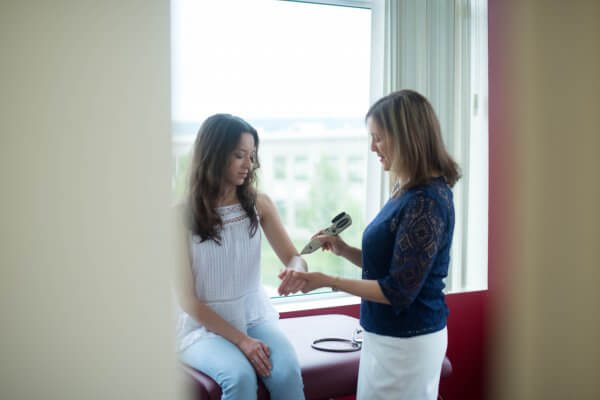Address:
470 Bronte St S Suite 202 Milton, Ontario L9T 2J4 Canada
PMS
Nature’s clock- PMS, or premenstrual syndrome. One of those things that many women experience. The good news is that PMS is some things that can be done to help lessen the physical and emotional symptoms you experience each month.

What is PMS?
Premenstrual syndrome is a combination of physical and emotional symptoms that can significantly affect a woman in the days or weeks leading up to her period. Cramping, bloating, irritability, and food cravings are some more common symptoms. In some women, PMS is so severe that it has its own psychiatric diagnosis; it’s called Premenstrual Dysphoric Disorder (PMDD) and is used to describe PMS with extreme anger or sadness each month.
Conventional Medicine & PMS
Conventional medicine isn’t able to offer much in the way of support: ibuprofen for cramps and prescription medications for other symptoms. Antidepressants like SSRIs are first-line therapy for PMS when the symptoms affect your ability to go to work. For women who can’t tolerate SSRIs, oral contraceptives (the birth control pill) is the next choice.
While the advances in female sexual liberation that came with the birth control pill are undoubtedly a good thing, the side effects of taking it are not. The pill alters the way your body produces hormones, and many women who take it end up with weight gain, mood swings, and food cravings – symptoms very similar to PMS, except consistently experienced. The birth control pill also depletes essential vitamins and minerals in your body, essentially starving your cells of the food they need. All in all, if it’s being used for anything other than contraception, there are better, healthier choices to help control your PMS.
What Can Naturopathic Medicine Offer?
Naturopathic medicine recognizes five subtypes of PMS that help guide natural treatment choices. Some women fall neatly into one category, and others may not. Either way, identifying the type and treating it appropriately can make a big difference for women.
PMS Type A – Anxiety Type
Women who are more anxious leading up to their period have PMS Type A; their symptoms can include irritability, mood swings, nervousness, and insomnia. At the hormone level, this results from a relative progesterone deficiency, and herbs for correcting that imbalance, such as chaste trees and black cohosh, can help. Treatments focusing on anxiety can also help, including acupuncture and stress management.
PMS Type C – Craving Type
PMS Type C is characterized by food cravings, whether it’s for carbohydrates, chocolate, salt, or sugar. We think a relative excess of insulin causes this type, making blood sugar levels fluctuate more than they should. Supplements that correct insulin and blood sugar, like chromium or cinnamon, can also help with this type.
PMS Type C – Craving Type
Women who show symptoms of depression, including sadness, easy crying, apathy, and in extreme cases, suicidal thoughts, have Type D PMS. These symptoms are often the result of relatively low estrogen and serotonin, and herbs like a chaste tree and red clover can help, in addition to proper exercise.
PMS Type H – Hyperhydration Type
Hyperhydration means excess water, and women with Type H PMS tend to have bloating, swelling, water retention, and weight gain before their period. The exact imbalances are unclear, and diuretic herbs like dandelion or nettle and potassium-rich foods like bananas can help ease your symptoms.
PMS Type H – Hyperhydration Type
This shows up in the form of cramping, low back pain, and other aches throughout the body. For P-Type PMS, removing foods you are sensitive to, and adding pain-relieving herbs, like turmeric and willow, can produce great results.
The Bottom Line
Like many health conditions, naturopathic doctors think about PMS differently from conventional medical practitioners. Where western medicine runs short on answers, NDs have had training in women’s health that helps us recognize different PMS types. In addition to herbs and supplements, NDs have training in acupuncture and clinical nutrition to ensure all the angles are covered, and your PMS gets resolved.
Treat your monthly visit from mother nature naturally and book an appointment today!
Get In Touch
Whether you're looking for a complimentary consult or a you're regular patient, you can select the right appointment that fits your schedule.
Ask us a Question Make an AppointmentPain Ease Naturopathic Clinic
470 Bronte St S Suite 202
Milton, Ontario L9T 2J4 Canada
Phone: 1 (647) 361-4187
Fax: (647) 361-4187
Email: info@painease.ca
Locations
Even though our clinic is in Milton, our patients come from all over the GTA. Click below to learn more.
Mississauga, Oakville, Burlington, Brampton, Halton Hills, Hamilton
